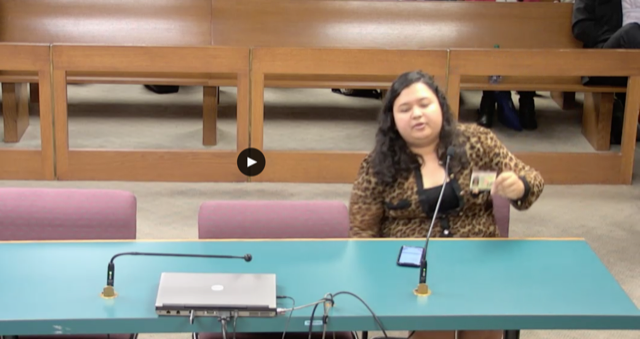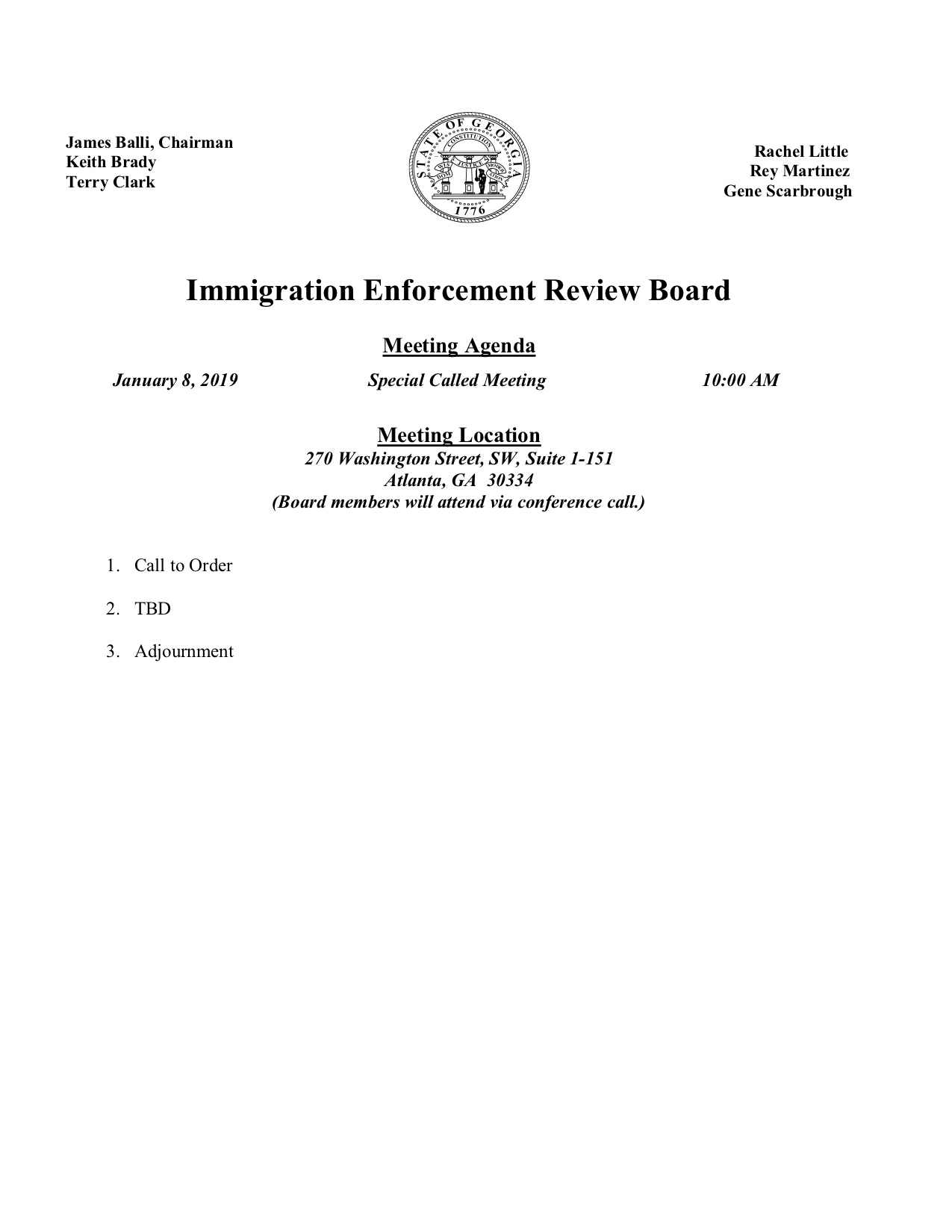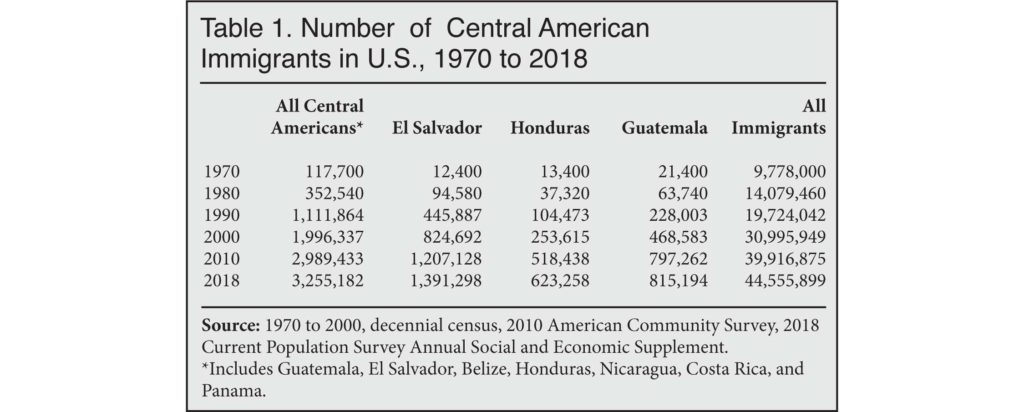Recent Posts Achrives
Georgia’s Cobb County Sheriff, Neil Warren, writes letter supporting a border wall
Joins a growing group of sheriffs nationwide expressing support for action on illegal border crossings

Longtime Cobb County, Georgia Sheriff Neil Warren has made public a letter to President Trump expressing his support for a border wall.
“As one of more than 3,000 sheriffs across this nation, I am painfully aware of the continuing loss of the innocent American lives and the escalating numbers of overdoses and drug-related deaths caused by members of Congress refusing to fund border security initiatives,” Warren wrote in his Monday letter. “The intentional indifference of those who are more interested in their personal political agenda than our public safety needs undermines law enforcement’s ability to fulfill our promise to keep our citizens, communities and nation safe” goes Warren’s letter, in part.
Sheriff Warren has served in his position since 2004 and was the first sheriff in Georgia to take advantage of the federal 287(g) program that expands the local law enforcement’s authority to help enforce immigration law.
Regarded as a hero to pro-enforcement Americans, Warren has been attacked by the corporate-funded anti-borders groups in the state for more than a decade. Estimates are that Georgia taxpayers spend approximately $2.5 billion annually on illegal immigration.
According to the left-leaning Georgia Budget and Policy Institute, Georgia is home to more illegal aliens than green card holders and more than the border state of Arizona. Cobb County is ranked number three in county populations of illegal aliens in the state.
Warren’s complete letter can be read here.
Warren joins more than thirty other sheriffs nationwide who have penned similar letters of support for a wall on the U.S. border with Mexico.
Georgia’s Immigration Enforcement Review Board – timeline of term overstays of board members IERB

Immigration Enforcement Review Board (IERB) established in OCGA 50-36-3 (2011, HB87)
The seven original IERB members were appointed between July and Sept. 2, 2011.
State law is clear that members are limited to two terms of two years per term.
OCGA 50-36-3 (b) The Immigration Enforcement Review Board is established and shall consist of seven members. Three members shall be appointed by the Governor, two members shall be appointed by the Lieutenant Governor, and two members shall be appointed by the Speaker of the House of Representatives. A chairperson shall be selected by a majority vote of the members. All matters before the board shall be determined by a majority vote of qualified board members. Members shall be appointed for terms of two years and shall continue to hold such position until their successors are duly appointed and qualified. A member may be reappointed to an additional term. If a vacancy occurs in the membership of the board, the appropriate appointing party shall appoint a successor for the remainder of the unexpired term and until a successor is appointed and qualified.
Appointed by Gov. Deal: Phil Kent, Shawn Hanley and Ben Vinson
Appointed by Lt. Gov Cagle: Boyd Austin, Mike Yeager
Appointed by Speaker Ralston: Robert Mumford, Terry Clark.
With the end of the first term, original members still on the IERB should have been reappointed in July and Sept. 2013 – with the end of that term being July/Sept. 2015. With the exception of the Speaker’s office on the reappointment of Terry Clark, it appears that none of the three offices that made the original appointments can produce any paperwork reflecting any reappointments. After a request for public records, Cagle’s office claimed exclusion from open records laws due to being part of the legislature.
Lt. Governor is an executive branch office under the state constitution.
Without being legally reappointed and without authority, members Kent, Hanley, Vinson, Yeager and Clark served well beyond the end of the four year limitation. As of December 29, 2018 Clark is still serving.
Ben Vinson resigned IERB sometime in June of July, 2017 after being appointed to the State Board of worker’s Compensation by Gov. Deal. In violation of state law, Vinson was active as IERB Chair from Sept. 2015 to the date of his resignation.
Shawn Hanley and Phil Kent both resigned in August 2018 when the term limit violation was made public.
In the same report linked above, it looks like the AG is staying far away from the entire matter.
IERB member John Kennedy was appointed in January 2013 after Robert Mumford resigned to become a judge. Kennedy won election to the state senate and James Balli was appointed to replace him by Speaker Ralston in Feb. 2014. The appointment letter specifically states Balli’s appointment would end in July 2015 or “until a successor is duly appointed.”
That would mean Balli’s two term limit would end in July 2017 – if he was duly reappointed. Public records of any such reappointment have not been produced.
* It could be that Balli will claim he was appointed to finish Kennedy’s term and could lawfully serve two terms of his own. I assert that argument is contrary to the language and intent of OCGA 50-36-3.
With this line of thinking: Mumford’s first term ended in Sept. 2013, Kennedy would have finished that term in 2015, but was replaced by Balli who was appointed in Feb 2014. Again, the Balli appointment letter states his term ends in 2015 or until a lawful reappointment or a successor appointment.
Reappointment of Balli would expire in 2017 – if he was duly reappointed.
Regardless of the question on Balli’s reappointment or his merely finishing another member’s term, because of the fact that that members Kent, Vinson, Hanley and Clark served and voted without authority after Sept. 2015, it is my position that any actions taken after Sept. 2015, including sanctions, complaint dismissals and board votes were done in violation of state law and are thereby null and void.
Opinion: Outgoing State Senator: DDS and the Board of Regents refused to provide requested information
Editor’s note: The below column was sent here yesterday from Senator McKoon and we post it with several links to further educate the reader. Full disclosure: Senator McKoon is a personal friend.

By Josh McKoon
As I wind up my eight years of service in the Georgia State Senate I cannot leave without commenting on the resistance of the administrative state to conservatives, even when requesting basic information.
In February of 2018 I made a basic request of the Georgia Department of Drivers Services for information relating to the types of driver’s licenses and official ID Cards they issue. I asked DDS for images of every format of drivers license and ID Card.
Almost one year later my request continues to be ignored.
Thankfully, due to the efforts of citizen activist D.A. King, we finally have that information. Why is it important? Because for years, Georgia has been issuing these credentials to individuals the United States Citizenship and Immigration Services tells us are illegal aliens.
This, while DDS gave partial information on the issue and only assured the public and legislators that only non-citizens with “legal status” could obtain a drivers license or ID Card. DDS refused to educate legislators on the entire issue or reveal that under the REAL ID Act, illegal aliens with special deferrals in deportation are granted “evidence of legal status” along with their deportation delays – for purposes of drivers licenses and ID Cards only. They are nonetheless illegal aliens.
DDS was careful to never offer inquisitive lawmakers the full story on the fact that USCIS says these aliens have no legal status or lawful presence.
My goal was to create a new design for the drivers licenses and ID Cards we are issuing to officially document these “undocumented” immigrants, including vertical orientation to set them apart from legal immigrant’s IDs and licenses.
Those who opposed my idea claimed that DDS did not issue licenses or ID Cards that are vertically oriented or printed with other distinguishable features other than the documents given to legal immigrants. We were told it would “be cost prohibitive” to design a special and unique license for the people that USCIS says lack legal status.
DDS prints all sorts of specialty drivers licenses and ID Cards that do include vertical orientation, including for American citizens under age twenty-one. In all, DDS issues about twenty-four different drivers licenses and ID Cards. Some are specially marked for inmates in state correctional facilities. Even CDL inmate drivers licenses.

This is information DDS refused to disclose to a duly elected representative of 175,000 Georgians and information we only now have because of Mr. King’s efforts under the Georgia Open Records Act.
Who exactly is in charge of our government? Is it the legislators you elect to represent you or unelected and anonymous bureaucrats who simply deny, delay, and wait out the elected officials who come and go?
Sadly this pernicious resistance to a policy maker attempting to acquire information relevant to formulating public policy isn’t limited to DDS.
I have requested and been told twice that the Board of Regents would send me information regarding policies on reduced tuition rates for illegal aliens in our state colleges and universities. But here we are with one week left in my term and they still have failed completely to turn over this information which is vitally important to understand what public benefits are being conferred on illegal aliens while the children of Georgia residents and U.S. citizens are subjected to ever higher tuition rates and fees.
If they can ignore these requests from me, it can happen to any elected official. I am making this public now as a last resort after patiently waiting for months for these requests to be fulfilled. While I have no expectation that these bureaucrats who sought to frustrate my efforts to obtain basic information at every turn will finally comply instead of waiting for my term to expire, I do hope this starts a conversation on how much longer the people of Georgia will put up with bureaucrats who comprise an administrative state largely hostile to the aims of common sense conservatives.
Republican Josh McKoon represents District 29 in the state senate and was first elected in 2010.
Illegal aliens tampering with American elections, including in Georgia: L.A. Times – “How young immigrant ‘Dreamers’ made flipping control of the House a personal quest”

D.A. King
The L.A. Times has put out a news report about the hard work of the illegal aliens who former President Barack Hussien Obama granted executive amnesty with his DACA program to flip the U.S. House to Democrat control. As one who has watched these perpetually angry illegals – called “dreamers” by the liberal media – lobby against immigration enforcement and official English in the Georgia Capitol for the last five years, this writer can attest that they are quite active. And that many Republican state legislators are very timid in dealing with them. When the effort was made to end the current Georgia policy of giving “dreamers” the same exact drivers license and ID Cards as legal immigrants and guest workers here on legal visas, it was these corporate-funded illegals who succesfully led the fight against passage. In 2012, Obama told us the the DACA illegals could never become U.S. citizens. That is not true. One of the “dreamers” Maria Palasios is now a U.S. citizen and works for the far-left and discredited GALEO Corp. and has even run for stat office here in Georgia.
I wrote about that here.
The L.A. times story explains how involved and influential the illegal aliens – foreigners here illegally with a deferral on deportation – have become in American elections.
Imagine the influence the incoming batch of “dreamers” will have on American politics. Right now, there are about 15,000 “migrant” children, mostly from Central America, being cared for in shelters paid for by American tax dollars waiting to be distributed across the country. Along with “family units” who are setting records for crossing American borders, according to Customs and Border Protection, an average of 175 unaccompanied ‘children’ cross the southern border illegally every day. In a few years, they will be marching in the streets of America as teens and twenty-somethings screaming that they are “Americans without papers” and demanding another DACA-type amnesty. And, they will likely be successful. All the time, they will be lobbying in Washington DC and state Capitols as victims of borders and intimidating politicians who would rather capitulate than risk name-calling by the left and the media. Sorry for the repetition.
From the L.A. Times:
“Gabriela Cruz, who was brought to the U.S. illegally when she was 1, couldn’t vote, but in the final hours before the Nov. 6 election, she was making one last run to get people to the polls.
The sun was setting in Modesto when she found Ronald Silva, 41, smoking a cigarette on a tattered old couch behind a group home. He politely tried to wave her off until she reminded him he had a right that she as an immigrant without citizenship didn’t have.
“It could really make a change for us,” said Cruz, 29.
Half an hour later, she was helping Silva look up candidates as he filled out his ballot by the light of her phone. “I’m glad you guys came,” he said. “I was going to leave it in my drawer.”
Young immigrants, known as “Dreamers,” have become a political force over the last two decades as they have pushed Congress to overhaul the nation’s immigration laws. Part of a new wave of immigrant activists who mobilized this year to return control of the House to Democrats, Cruz and others in the movement see in President Trump an existential threat to their futures, and to their friends and family.”
Spring, 2018: GOP Blocks Georgia Immigration Enforcement Bill, But OKs Traffic Cameras
Breitbart News
April 15, 2018
DA King: GOP Blocks Georgia Immigration Enforcement Bill, But OKs Traffic Cameras
The Republican Speaker of the Georgia House blocked a bill that would help deport criminal illegal aliens, but he pushed through a last-minute bill touted by his lobbyist son, according to the Atlanta Journal-Constitution.
The paper reported April 12:
Georgia House Speaker David Ralston delayed the end of this year’s legislative session past a midnight deadline so lawmakers could vote on a bill to allow speeding ticket cameras in school zones.
The bill was pushed by Ralston’s son, a lobbyist for an Arizona-based company, American Traffic Solutions, that sells the camera systems to local governments.
…
Ralston and Lt. Gov. Casey Cagle, the president of the state Senate, agreed to continue working past midnight to allow the House to approve the bill after it had passed the Senate a few minutes earlier, said Kaleb McMichen, a spokesman for Ralston, a Blue Ridge Republican.
In contrast, Ralston refused to allow a vote on a public safety bill in the GOP-dominated House before ended its annual session on March 30. Corporate-funded anti-borders groups took credit for the defeating the bill, which would have required state officials to notify federal immigration-enforcement officers of illegal migrants in the state’s jails.

“We ran out of time before we had finished all the bills that were worthwhile,” said House Majority Whip, Christian Coomer. “Other bills took priority and SB452 wasn’t called before the clock struck midnight,” he told the liberal Atlanta Journal-Constitution newspaper. Read the rest here.
Opinion: Kangaroo Court? Georgia’s Immigration Enforcement Review Board (IERB) calls a special meeting with agenda to be determined : It’s via telephone and if you want to hear it, you must go to downtown Atlanta and through security

__
Email received from Audits and Accounts, December 31, 2018 at 3:38 PM:
Good Afternoon,
The Immigration Enforcement Review Board has scheduled a Special Called Meeting for Tuesday, January 8, 2019 at 10:00. The members will be holding this meeting via conference call. A conference call line will be set up in Room 1-151 at the Georgia Department of Audits and Accounts if you wish to hear the meeting in person. The address for the Georgia Department of Audits and Accounts is listed on the agenda. The building is located at the corner of Trinity Avenue and Washington Street. Please enter the building on the Trinity Avenue side. You will need to go through security and show a valid ID to enter the building. I have attached a tentative agenda, but will resend.
Thank you,
Carol Schwinne
| Carol G. Schwinne| DirectorAdministrative Division
Georgia Department of Audits and Accounts 270 Washington Street, S.W., Suite 1-156 Atlanta, GA 30334 Office: 404.463-2670 | schwinne@audits.ga. gov |
|
| audits.ga.gov |
mail.audits.ga.gov made the following annotations on 12/31/18:
NOTICE: This e-mail (including attachments) may contain information that is confidential and legally privileged. If you are not the intended recipient, you are hereby notified that you have received this document in error and that any review, dissemination, distribution or copying of this message is strictly prohibited. If you have received this in error, please notify us immediately and delete the message.
Thank you for your cooperation.
__
***Note: More on the IERB here and here.

U.S. Central American Immigrant Population Increased Nearly 28-Fold since 1970
Center for Immigration Studies
Central American Immigrant Population In U.S. Increased Nearly 28-Fold since 1970
Poverty and welfare use double that of native-born Americans
By Steven A. Camarota and Karen Zeigler on November 1, 2018
Recent news coverage of a caravan from Central America hoping to enter the United States illegally has raised interest in the number and characteristics of Central Americans in the country. A new analysis by the Center for Immigration Studies of the latest Census Bureau data, which includes legal and illegal immigrants, shows that the size of the Central American immigrant population (from Guatemala, El Salvador, Belize, Honduras, Nicaragua, Costa Rica, and Panama) has grown enormously in recent decades. It also shows immigrants from the region often struggle with high rates of poverty and welfare use and low average incomes. The reason this is the case is not due to an unwillingness to work. In fact, Central Americans (ages 18 to 64) are slightly more likely to hold a job than native-born Americans. Rather their high rates of poverty and welfare use are due to their low levels of education, which, as their numbers have soared, have declined dramatically relative to natives.
Among the findings:
- The number of immigrants from Central America (legal and illegal) has grown 28-fold since 1970, from 118,000 to nearly 3.3 million in 2018 — six times faster than the overall immigrant population.
- In 2018, 87 percent of Central American immigrants came from three countries — El Salvador, Guatemala, and Honduras.
- El Salvador is the largest sending country from the region, with 1.4 million immigrants in the United States, a 112-fold increase since 1970. Guatemala is second with 815,000, followed by Honduras with 623,000.
- Based on prior estimates by the Department of Homeland Security, slightly more than half of El Salvadorans are in the country illegally, as are about two-thirds of Guatemalans and Hondurans.1
- A large share of Central Americans struggle in the United States, but it is not because they are unwilling to work. In fact, 76 percent of working-age immigrants from the region had a job in the first part of 2018, compared to 73 percent of the native-born.
- The primary reason so many Central Americans are poor and access welfare is that, as their population has grown in the United States, their education level relative to natives has declined dramatically:
- In 1970, 49 percent of Central Americans had not completed high school, compared to 42 percent of natives — a seven percentage-point gap. In 2018, 47 percent of Central Americans had not completed high school, compared to 6 percent of natives — a 41 percentage-point gap.
- In 1970, 4 percent of Central Americans had at least a bachelor’s degree, compared to 5 percent of natives — a one percentage-point gap. In 2018, 10 percent of Central Americans had at least a bachelor’s degree, compared to 38 percent of natives — a 28 percentage-point gap.
- Because such a large share of Central Americans have modest levels of education, the share of immigrants and their young children from the region who live in poverty is twice that of natives — 22 percent vs. 11 percent.
- Perhaps most troubling, 31 percent of the children (under age 18) of Central Americans live in poverty, roughly double the 16 percent rate for the children of natives. Also, 66 percent of the young children of Central Americans live in or near poverty.
- On average, Central Americans make only 61 percent as much as the average native-born American. Even Central Americans who have lived in the country for more than 10 years still only have 65 percent of the average income of the native-born.
- Given the large share of Central Americans with low incomes, it is not surprising that so many access the welfare system. In 2018, 56 percent of households headed by Central American immigrants used one or more major welfare programs, more than double the 26 percent of native households.
- The welfare figures for 2018 come from the Current Population Survey (CPS), which understates welfare use, particularly among immigrants. So the actual welfare use rates are even higher than those reported here.2
- Although illegal immigrants and new legal immigrants are barred from most welfare programs, the restrictions do not apply to all programs. Moreover, some states allow otherwise ineligible immigrants to access programs at state expense; and most important, immigrants, including illegal immigrants, can receive benefits on behalf of U.S.-born children, who are awarded citizenship at birth.
- The high welfare use of Central Americans reflects the fact that, while most work, their education levels mean they often earn low wages in the modern American economy and are unable to support themselves or their own children in many cases and turn to American taxpayers by using the welfare system.
- Welfare use is common among both recently arrived and more established Central Americans. Among households headed by Central Americans in the country for 10 years or less, 55 percent used one or more welfare programs, while the figure is 56 percent for households headed by a Central American in the country for more than 10 years.
- Welfare use is very high for all three top-sending countries from the region. Of households headed by El Salvadoran immigrants, 60 percent use at least one major welfare program; the figure is 59 percent for Guatemalans and 52 percent for Hondurans.
- Overall, Central American households’ use of cash welfare is similar to that of native households, but the share of Central American households receiving some type of food assistance is 2.5 times that of natives — 36 percent vs. 14 percent. The share of Central American households with at least one person on Medicaid is more than double that of native households — 45 percent vs. 20 percent. Read the rest here.

Cato Institute: Forget the Wall Already, It’s Time for the U.S. to Have Open Borders

Jeffrey Miron is director of economic studies at the Cato Institute and the director of undergraduate studies in the Department of Economics at Harvard University.
Cato Institute
Forget the Wall Already, It’s Time for the U.S. to Have Open Borders
“President Donald Trump’s recent tweets against open borders come as no surprise. Indeed, even fervent immigration advocates worry that open borders would lower the wages of low-skilled natives, erode national security, and overburden the social safety net. Trump doubled down, tweeting that he would be “willing to ‘shut down’ government” unless Congress approves funding for a border wall with Mexico.
Trump, however, has it exactly backwards: The solution to America’s immigration problems is open borders, under which the United States imposes no immigration restrictions at all. If the U.S. adopts this policy, the benefits will far outweigh the costs.
Legalize ALL immigration
Illegal immigration will disappear, by definition. Much commentary on immigration — Trump and fellow travelers aside — suggests that legal immigration is good and that illegal immigration is bad. So, legalize all immigration.
America has nothing to fear, and much to gain, from open borders.
Government will then have no need to define or interpret rules about asylum, economic hardship, family reunification, family separation, DACA (Deferred Action for Childhood Arrivals) and so on. When all immigration is legal, these issues are irrelevant.
The question of fairness about who enters first — those who waited in line or those who entered illegally — disappears. Amnesty for existing illegal immigrants also becomes a non-issue. Or an open borders policy could require anyone who entered illegally to exit the country — for exactly five minutes — and then re-enter legally.
Think about the money we could save and make
Expenditure on immigration enforcement would shrink to nothing, because open borders means no walls, fences, screening at airports, ICE (Immigration and Customs Enforcement), deportations, detention centers or immigration courts. A 2013 report estimated that immigration enforcement cost more than $18 billion annually, and standard indicators suggest costs have grown further since then.
Last year, U.S. employers filed over 336,000 petitions for H1-B visas for highly skilled foreign workers, but only 197,129 were approved. Complicated visa rules – for tourists versus job-seekers, STEM (science, technology, engineering and math) workers versus agricultural laborers, and students versus non-students – would all vanish. This would save resources and give employers new access to talented human capital.
The time people waste re-entering the country will evaporate. How often do you face long delays when entering Oklahoma from Texas? Never. But how often do you experience delays when you leave other countries for the United States? Almost always. One study pegs the cost of wait times at the U.S.-Mexico border alone to be more than $12 billion a year.
Economic efficiency will increase both in the USA and in immigrant-sending countries, because different kinds of labor will be better matched around the world to their most productive activity. This benefits the immigrants who earn higher incomes, but also U.S. consumers who face lower prices for imported goods and services. One academic study predicts that if borders were open everywhere, world gross domestic product could be twice its current value.
They will send their best…” Read the rest here.
Border Patrol Snags More MS-13 Members, Convicted Sex Offenders Trying To Jump Border – Daily Wire

Daily Wire
December 23, 2018
By Emily Zanoti
Border Patrol Snags More MS-13 Members, Convicted Sex Offenders Trying To Jump Border
United States Customs and Border Protection say they have arrested at least two more members of the notorious MS-13 gang, and two convicted — and previously deported — sex offenders trying to cross the United States-Mexico border.
The Daily Mail reports that CBP apprehended the four men in four separate incidents ranging across the southern border from Arizona to Texas. All four had had previous run-ins with border patrol.
“On Wednesday, agents arrested a 46-year-old Mexican national, after he illegally entered the U.S. near Lukeville,” the Mail reported. “During processing, agents discovered he was convicted in 2002 of unlawful sexual conduct with a minor in Mesa, Arizona.”
“Then on Thursday evening, Nogales Station agents arrested a 24-year-old national of El Salvador,” the report continued. “During processing, agents conducting records checks learned that he is a member of MS-13, a violent trans-national criminal organization operating in many parts of the U.S.”
Specific details weren’t available on the other two men, but CBP did report that one was a member of MS-13 and the other had been previously convicted of a sexual crime and deported back to his home country. All four appear to have been booted from the United States between 2012 and 2013 and returned, recently, with the influx of asylum-seeking migrants.
This isn’t the first time that MS-13 has been caught hiding among asylum seekers. Back in November, border patrol agents intercepted a member of MS-13 who had been hiding himself in the so-called “migrant caravan.”
“Jose Villalobos-Jobel, 29, was arrested Saturday evening near the Calexico Port of Entry by agents who suspected he’d made it into California illegally, US Customs and Border Protection said in a statement,” the New York Post reported in late November… Read more here.

